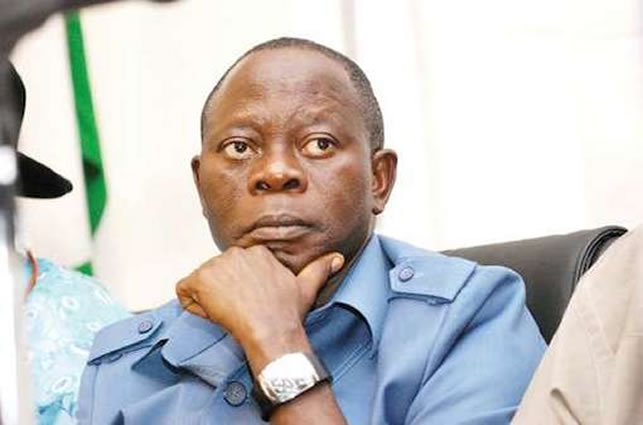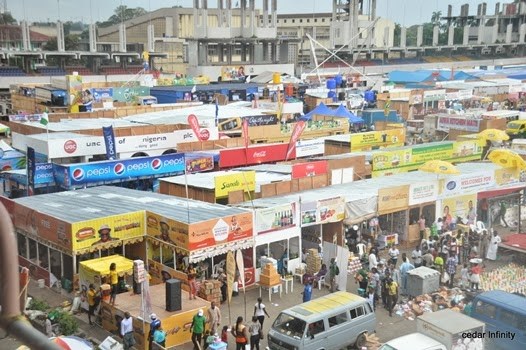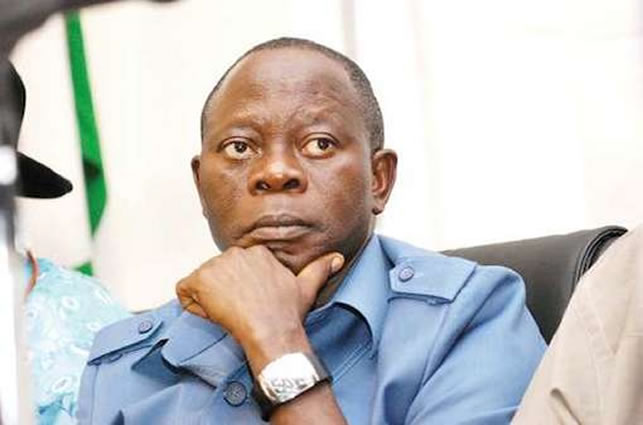Economy
Oshiomhole to FG: Don’t Use PENCOM Funds to Finance Budget Deficits

- Urges President to rejig security apparatus
- We’ll consolidate on our achievements – Buhari
By Mathew Dadiya, Abuja
The National Chairman of the All Progressive Congress (APC), Adams Oshiomhole on Wednesday, warned against the use of Pension Commission’s(PENCOM) funds to tackle budget deficits, since it was meant to address the critical issues of the masses who contributed the money.
The APC National Chairman said this in a remark at the first Presidential Policy Retreat organized by the APC administration.
Oshiomhole, therefore, called for a complete overhaul of the President’s economic policies to address inequalities and tackle poverty.
Oshiomhole who lamented that poverty has continued to ravaged Nigerians despite efforts by the current administration to address the scourge, urged governments to stop the use of PENCOM funds as stop gap measures to fund budget deficits and facility for infrastructure development by both Federal and State governments.
President Muhammadu Buhari had declared the retreat open.
Oshiomhole also called for rejig of security architecture in the country.
He urged the retreat to brainstorm towards getting practical solutions to the problems facing Nigeria.
On corruption, he urged the government to effectively plug leakages with all the Ministries Departments and Agencies reviewing ‘how’s to achieve it.
Oshiomhole also recommended long term national economy plan to replace the current Economic Growth and Recovery Plan.
Acknowledging that so much progress has been made in the past four years in the fight against corruption, economy and security, he said there were still huge challenges and room for improvement.
“The logic behind introducing the pension scheme under PENCOM, was that the workers’ social capital that they deducted every month which they would not need to draw on until they retire about 30 years or 35 years later, provide a basis for long term fund,” he explained.
Oshiomhole while speaking further, said: Happily, PENCOM has generated over five to six trillion naira since it commenced operation. Unfortunately, the money is borrowed by government both federal and state and unfortunately it is not available to address the social purpose of the working people whose contributions the pension fund evolved.
“I asked our expert to recognize that the primary purpose of the workers social capital is that it would be creatively managed and deployed to workers social needs including housing, education and all the other factors.
“It wasn’t meant to fund government’s deficit, it wasn’t meant to support federal government deficit it was meant to address the primary social purpose of those who work, so that they are sure that by the time they finished their employment that they are retired, they have a modest home to retire to.
“I think we must visit these issues, address them because this President if he has opposition he is among the rich, if he has supporters he is among the poor. The poor people’s money must be used to addressed the critical challenges of the poor.
“May God drive our thoughts, our processes and rejig everything so that at the end of the day, those people would say yes sai Baba! We elected him, we trusted him and he has delivered.” he said
On the economy, he noted that there is the challenge of high rate of poverty in spite of all the efforts and in spite of coming out of recession.
He also pointed out that the rate of economic growth is still far less than the rate of population growth.
“If our economic growth rate is still lower than the rate of population growth poverty would remain endemic. On the economy, there is the challenge of high rate of poverty, inequality, access to credit and mortgage.
“Mr President, I know deep in your heart and assessing the basis of our campaign the issue of inequality is primary. We don’t just want to grow the economy, create more wealth, we are also interested in who is benefiting from this wealth and what policy instruments are required to ensure that inequality is addressed and that the average Nigerian people particularly the masses that constitutes the electorate, benefit from the fruit of growth.”
This, he said, will require a review of access to credit and access to mortgage, unemployment, low level of manufacturing cost and the need for diversification of the economy.
He said there is also need to increase revenue, block leakages and ensure budgets deliver services to the citizens.
He added “I am happy that the National Assembly is here because part of the challenges we have faced over the past five years, is that even though we had control in terms of membership of the National Assembly but we had our budgets been passed five months into the new year.
“Even that fact alone by itself explained challenges at the level of execution of budget.”
On anti corruption, Oshiomhole said “I believe that we can commendably beat our chests as to the extent to which we have gone in implementing our anti-corruption war but there is need to ensure that our range of actions covers prevention – that is system, involvement of the Nigerian citizens, the society, and the prosecution of offenders.
“There are many who have said that we should not just pursue corruption, we should deal with how to even prevent it. Many wondered how can a salary earner who desire to have a house but who is paid in 30 days interval where they are paid regularly and he earns a million a month that is even to put the number generously. How can he own a house, if a house cost as much as 10 million naira?” he queried
Stressing that the banking system is not delivery to the ordinary people, adding access to credit remained a major issue.
“Let me share my own ignorance, I am unable to understand for example as a worker why in Europe when they are in economic recession they reduce their interest rate, in Nigeria when we are in recession we increase our interest rate. How do we price money at such level and expect that the ordinary people can borrow to set up businesses?
“We do need practical solutions beyond theories. We need to re-examining our condition what we saw different from what we see elsewhere in the world.
“If you want to buy a car Mr President, you must have twenty million to pay cash, to have twenty million to pay cash if you are not a big businessman it cannot possibly come from a legitimate salary given the known salary structure in the Nigerian public sector and even the disclosed portion of the Nigerian private sector.
“So if people desire to buy a car and the banking system is not open to credit the only way is to steal in order to purchase. But we have all travelled round the world, ten percent is enough to own a car if you have verifiable job and a banking history and you pay in installment, month by month until you deferred the car.
“As a worker you know the benefit of that if you don’t work and you are fired that car would be recovered by insurance company or whoever is the lender.
So we do need to review all of these so that in dealing with corruption, we deal with the preventive part.
“This retreat should critically review our achievements in the first term and map out strategy for the second term. What we hope to achieve in this Next Level Agenda is clear – challenges, how it should be done. This is why I want to challenge us to look at the following issues amongst others.” he said
Oshiomhole went on “The need for a long term national development plan to replace the Economic Recovery and Growth Plan which is expected to end in the next few years.
“The need to improve our revenue through blocking leakages and ensuring that every revenue agency remits to the federation account what is due in a timely manner.
“Of course, in this we must commend the President for introducing the Treasury Single Account (TSA). But as operators would tell you this policy is there but we must improve our strategy to ensure that leakages that are still there are effectively blocked.
“So the issue is how? The need for every ministry, departments and agencies to have a strategy plan to review the question of how because to be honest, everybody knows what is wrong. Even more importantly everybody knows what we ought to do, the challenge is one word – how?
“We know we have a huge number of unemployed people we know there is a need to have them back to work but the question is how?
So the need to put an effective coordinating mechanism to ensure policy coherence and coordination between arms and tiers of government.
“We need to radically change the budget contents, we need to do everything possible to reduce the recurrent expenditure from the current 70 percent and increase the budgetary allocation to the four sectors that are part of the life of citizens. Namely the health sector, education, agriculture, infrastructure.
“The more money we spend on recurrent, the less that is available for these critical areas.
It is not acceptable that we spend 80 percent on recurrent and we have some of our children in some states being taught under the tree even during this raining season.
“There is need for radical decisions to change this so that those millions of poor people who we saw across the states who fanatically believe in the person of our president and through the president, connect with our party, we must put appropriate policies in place to ensure that at the end of the day we can measure how all of the things we have done or we are going to do at the end of the four years has impact on their quality of lives.
“We need to implement anticorruption strategy in a comprehensive manner that would evolve the system, society and sanction.”
On security architecture, he said “The need to rejig the security apparatus and operational use community policing which is already being discussed but I think we need to go into the specific on the issue of “how.”
“Because every minute, every second is going as a party founded on the philosophy of social democracy we need to expand programmes that touch on the lives of such as the social housing, social investment programme, access to public healthcare, access to public education and support to small scale industries.” he said.
“The outcomes of this Policy Dialogue will be wholly advisory and implementation will be left to the federal machinery of Government.” he said
Those at the retreat included Vice President Yemi Osinbajo, Secretary to the Government of the Federation, Boss Mustapha, Aliko Dangote, Jim Ovia and former Prime Minister of Ethiopia, Hailemariam Desalegn.
State governors included those of Kebbi, Plateau, Kano, Kaduna, Kogi, Imo, Bauchi, Ekiti, Edo, Borno and Lagos.
President Buhari, while declaring the retreated open, noted that his administration came into office in 2015 at a period of economic recession following sharp drop in the global oil price and years of economic and financial mismanagement.
He maintained that his administration would consolidate on the successes achieved in his first term.
The president said his administration restored economic growth, curbed inflation and shored up external reserves through various monetary and fiscal measures.
He said that his administration has witnessed eight quarters of consistent marginal growth of the economy over the past two and a half years.
“We have made progress in the agricultural sector especially in food production and processing through our Food Security and Anchors Borrowers Programmes, which provide concessionary credit facilities to farmers in crop production as well as large-scale investors in food processing and manufacturing.
“To consolidate on these and other successes, we will continue to provide incentives that will facilitate investments and create jobs in key import substitution programmes.
“In line with the “Next Level Strategy” of our party, the All Progressives Congress, which seeks to consolidate on our achievements over the past four years, this policy dialogue session has been conceived to; “Advise the government over the next four years to deliver on our promises in a manner that reflects true changes to the livelihood of the people.
“Discuss and propose for Federal Government’s approval, key strategies and high impact initiatives to stimulate economic growth and development.”
Concerted effort, he said, requires the convergence of various stakeholders cutting across the private sector, developmental partners, industry experts to dialogue and forge a way forward.
He said his administration is committed to consolidating the successes of the first term and creating an avenue where the Nation’s investments and resources are geared towards sustainable development.
“We will implement structures that will accelerate speedy execution of these initiatives.
Economy
Customs Zone D Seizes Contraband Worth N110m

The Nigeria Customs Service (NCS), Federal Operation Unit (FOU), Zone D, has seized smuggled goods worth over N110 million between April 20 till date.
The Comptroller of Customs, Abubakar Umar, said this at a news conference on Tuesday in Bauchi.
He listed the seized items to include 11,200 litres of petrol; 192 bales of second hand clothing, 140 cartons of pasta, 125 pairs of jungle boots, 47 bags of foreign parboiled rice and 9.
40 kilogramme of pangolin scales.Umar said the items were seized through increased patrols, intelligence-led operations, and strengthened inter-agency collaboration.
The comptroller said the pangolin scales would be handed over to the National Environmental Standards and Regulations Enforcement Agency (NESREA) for appropriate action, while the seized petrol would be auctioned, and the proceeds remitted to the federation account.
He attributed the decrease in smuggling activities of wildlife, narcotics, and fuel to the dedication and professionalism displayed by the personnel in line with Sections 226 and 245 of the NCS Act 2023.
The comptroller enjoined traders to remain law abiding, adding the service would scale up sensitisation activities to combat smuggling.
“We remain resolute in securing the borders and contributing to Nigeria’s economic development,” he said.
The FOU Zone D comprises Adamawa; Taraba, Bauchi, Gombe, Borno, Yobe, Plateau, Benue and Nasarawa. (NAN)
Economy
Trade Tensions: Global Economy Stands at Fragile Turning Point -UN

The UN Department of Economic and Social Affairs (UN DESA) has said that the global economy stands at a fragile turning point amid escalating trade tensions and growing policy uncertainties.UN DESA, in a report published on Thursday, stated that tariff-driven price pressures were adding to inflation risks, leaving trade-dependent economies particularly vulnerable.
It stated that higher tariffs and shifting trade policies were threatening to disrupt global supply chains, raise production costs, and delay key investment decisions – all of this weakening the prospects for global growth. The economic slowdown is widespread, affecting both developed and developing economies around the world, according to the report.For instance, in the United States, growth is projected to slow “significantly”, as higher tariffs and policy uncertainty are expected to weigh on private investment and consumer spending.Several major developing economies, including Brazil and Mexico, are also experiencing downward revisions in their growth forecasts.China’s economy is expected to grow by 4.6 per cent this year, down from 5.0 per cent in 2024. This slowdown reflects a weakening in consumer confidence, disruptions in export-driven manufacturing, and ongoing challenges in the Chinese property sector.By early 2025, inflation had exceeded pre-pandemic averages in two-thirds of countries worldwide, with more than 20 developing economies experiencing double-digit inflation rates.This comes despite global headline inflation easing between 2023 and 2024.Food inflation remained especially high in Africa, and in South and Western Asia, averaging above six per cent. This continues to hit low-income households hardest.Rising trade barriers and climate-related shocks are further driving up inflation, highlighting the urgent need for coordinated policies to stabilise prices and protect the most vulnerable populations.“The tariff shock risks hitting vulnerable developing countries hard,” Li Junhua, UN Under-Secretary-General for Economic and Social Affairs, said in a statement.As central banks try to balance the need to control inflation with efforts to support weakening economies, many governments – particularly in developing countries – have limited fiscal space. This makes it more difficult for them to respond effectively to the economic slowdown.For many developing countries, this challenging economic outlook threatens efforts to create jobs, reduce poverty, and tackle inequality, the report underlines. (NAN)Economy
FG To Finalize N1.5trn Road Concession Project- Edun

The Minister of Finance and Coordinating Minister of the Economy, Mr Wale Edun, says the Federal Government will soon finalise N1.5 trillion road concession project.
Edun made the statement during a meeting with some private sector investors in Abuja on Wednesday.
He said that the government was on the verge of finalising the landmark N1.
5 trillion road concession project, launched in 2021 under the Highway Development and Management Initiative (HDMI).The minister said that the initiative aimed to involve private sector partners in the reconstruction and management of nine major highways across the country, spanning approximately 900 kilometers.
He said that the partners had almost completed all arrangements for the highways, which they would finance, rebuild, and maintain under 25-years concession agreements.
Edun said that the concessionaires were expected to recoup their investments through tolling fees.
“We met the concessionaires who have virtually concluded all the agreement arrangements for nine roads, nine major highways, which they are contracting to refinance the rebuilding of and to recover their funds from tolling fees under 25-year or so agreements.
“And we met them to iron out the remaining administrative obstacles for the kicking off construction of these roads,” he said.
Edun said that the substantial private sector investment would bridge budgetary gaps.
He added that it would also allow investors to undertake revenue-generating projects, leveraging their expertise and resources for long-term implementation and maintenance.
“Thereafter, it will be a question of signing the addendums and moving to the site.
“As you know, already the 125-kilometer Benin–Asaba Highway concession agreement has been signed. The addendum has been signed.
“All arrangements have been finalised, in fact, the ministry of works have handed over the road to the concessionaires.
“They have already started the preliminary arrangements for reconstruction of that road in place of a 10 lane highway.
“It is an investment, it’s a project and an initiative that will reduce the travel time between Benin and Asaba right up to the Niger Bridge,” the minister said.
Edun said that the Benin–Asaba Highway project, which has already commenced, is expected to reduce travel time between Benin and Asaba from four hours to one hour, significantly enhancing productivity and efficiency in the region.
He described the HDMI, launched in 2021, as a strategic programme by the federal government aimed at attracting private sector investment to improve Nigeria’s federal road network.
Edun said that the initiative seeks to address the challenges of inadequate funding and maintenance by leveraging Public-Private Partnerships (PPP) to develop and manage road infrastructure.
Under the HDMI, 12 highways were initially selected for concession, covering a total of 1,963 kilometers.
These roads include Benin–Asaba, Abuja–Lokoja, Kano–Katsina, Onitsha–Owerri–Aba, Shagamu–Benin, Abuja–Keffi–Akwanga, Kano–Shuari.
Others are Potiskum–Damaturu, Lokoja–Benin, Enugu–Port Harcourt, Ilorin–Jebba, Lagos–Ota–Abeokuta, and Lagos–Badagry–Seme roads.
The minister said that the initiative was projected to generate over 50,000 direct and 200,000 indirect jobs, contributing significantly to the country’s economic growth and development.
The Minister of Works, Engineer David Umahi who joined the meeting virtually reassured the private sector partners on the HDMI of the federal government commitment.
He said that everything possible would be done to resolve the contending issues, adding he will soon be back to address all pending issues.
One of the concessionaires, Mr Kola Karim, representing Shoreline, emphasised the need for right and enforceable documents stipulating the takeoff and handover dates, which would attract investors to invest their funds.
Other private sector partners also requested for the addendum to the original agreement to be signed that would enable toll sections of the completed highways while work was in progress on other sections.
They noted that each concessionaire has unique challenges that should be dealt with accordingly.
Also in the meeting were Minister of Budget and Economic Planning, Abubakar Bagudu, and the Director General Infrastructure Concession and Regulatory Commission (ICRC), Dr Jobson Ewalefoh





















